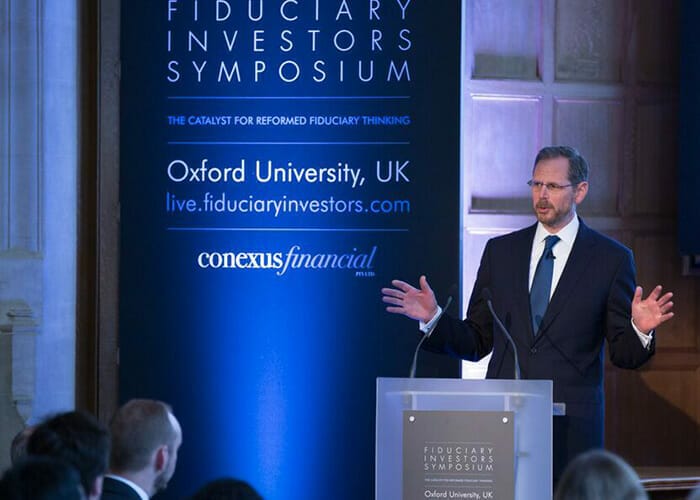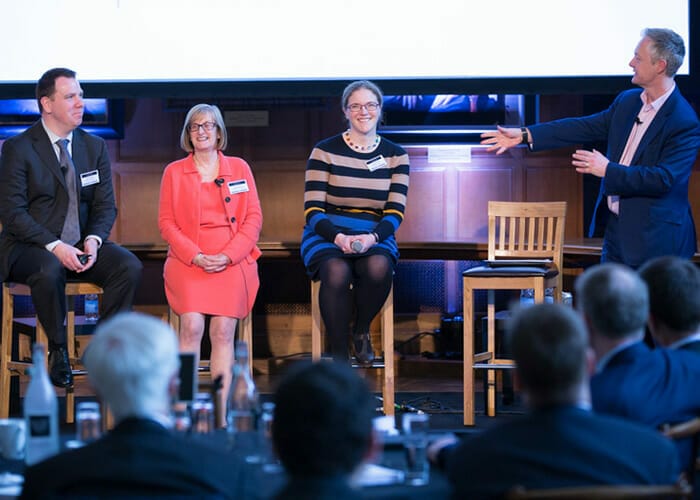Albert Einstein said, “We cannot solve problems by using the same kind of thinking we used when we created them.”
It’s a statement that Eric Beinhocker, professor of public policy practice, says is particularly apt when it comes to addressing capitalism today. Speaking at the Fiduciary Investors Symposium at the University of Oxford, he argued that Western capitalism is broken and needs fixing. Although he said there was no quick and easy answer, he suggested different ways to think about the world.
Beinhocker, executive director of The Institute for New Economic Thinking at the Oxford Martin School, argued that the vast majority of people in the West aren’t benefiting from capitalism and haven’t for a while. In the US, where the data is most extreme, incomes for the bottom 90 per cent of the population have flatlined since the early 1970s. All the gains in the economy have gone to the top 1 per cent of the population, due to an uncoupling of wages from productivity and profit from investment.
“People are as productive, but where did the profits go?” he asked. “It all went to the top, and the people participating didn’t benefit.”
There are many changes behind the breakdown. All the jobs growth has occurred at the top or bottom of the income spectrum, while employment in the middle has fallen. Pension and healthcare costs, which corporations or governments have traditionally borne, have shifted onto the shoulders of families. There has been a “great disinvestment” in infrastructure with little money going into the real economy. All of this has coincided with unprecedented environmental damage, Beinhocker said.
In Einstein’s axiom, this shift from earlier “constructive capitalism” to “extractive capitalism” is the kind of thinking that created the problem. It has led to a breakdown in the social contract of inclusivity and participation. The idea that if you contribute you get something back has died, leading to feelings of unfairness and a loss of trust in the system. It has triggered a moral outrage stoked by the media, and a desire to punish the elites who have broken the social contract.
Today’s problem stems not from globalisation or technology but from fundamental changes in economic thinking and policy dating from the early 1970s.
“This is when the system broke down,” Beinhocker said. “We can see in the data. Giving and getting back used to work, but it broke down in 1973.”
The new ideas introduced in the ’70s and now firmly wired into today’s economy include widely held beliefs such as: corporations should be wholly run for the benefit of shareholders rather than multiple stakeholders; unemployment is a consequence of people preferring leisure; and labour is a cost to be minimised. In the early ’70s, policy set the market against the state and GDP became overwhelmingly important, Beinhocker said.
His solution is bottom-up reform of capitalism. He argued that economies were complex, adaptive systems, where designs and strategies evolved over time and macro patterns emerged from micro behaviour; that economies were neither simplistic nor linear, but dynamic, unfolding processes. An economy was a network of self-organising social phenomena tied to our physical environment, he said.
He argued that prosperity shouldn’t be measured in monetary terms but by the accumulation of, and access to, solutions to human problems, citing the invention of antibiotics as an example. The purpose of capitalism, therefore, should be to provide solutions to make our lives better. In this new metric, wealth becomes the accumulation of solutions, growth is the rate at which new solutions are created and made available, and prosperity is a set of solutions and our ability to access to them.
The goal of business and investment would be to create new and better solutions and make them more widely available, he continued. And markets and governments should work together to create an interdependent evolutionary ecosystem for creating solutions and providing access to them. It would require navigating between good and bad economic activities and sifting out those that don’t work for society, he explained. He pointed to climate change as an example of a “solution today” becoming “society’s problem tomorrow”.
Beinhocker said the solution he offered looked to capitalism’s inherent strengths. One of the reasons capitalism has been so successful has been its ability to foster innovation and co-operation to solve problems.
“Capitalism is the world’s largest co-operative system,” he said, citing the co-operation that goes into building a Boeing 787 as an example of that “co-operative dance” fundamental to solving problems; therefore, the future should involve bigger networks of co-operation and deeper and more specialised pooling of knowledge and inclusion.
The genius of capitalism is its ability to evolve. It has always passed through cycles and breakdowns. What is needed today is strong leadership in business and the investment community to turn the system back into a co-operative and constructive force.
“It has to happen fast,” he urged. “History shows we can get trapped for a long time.”




